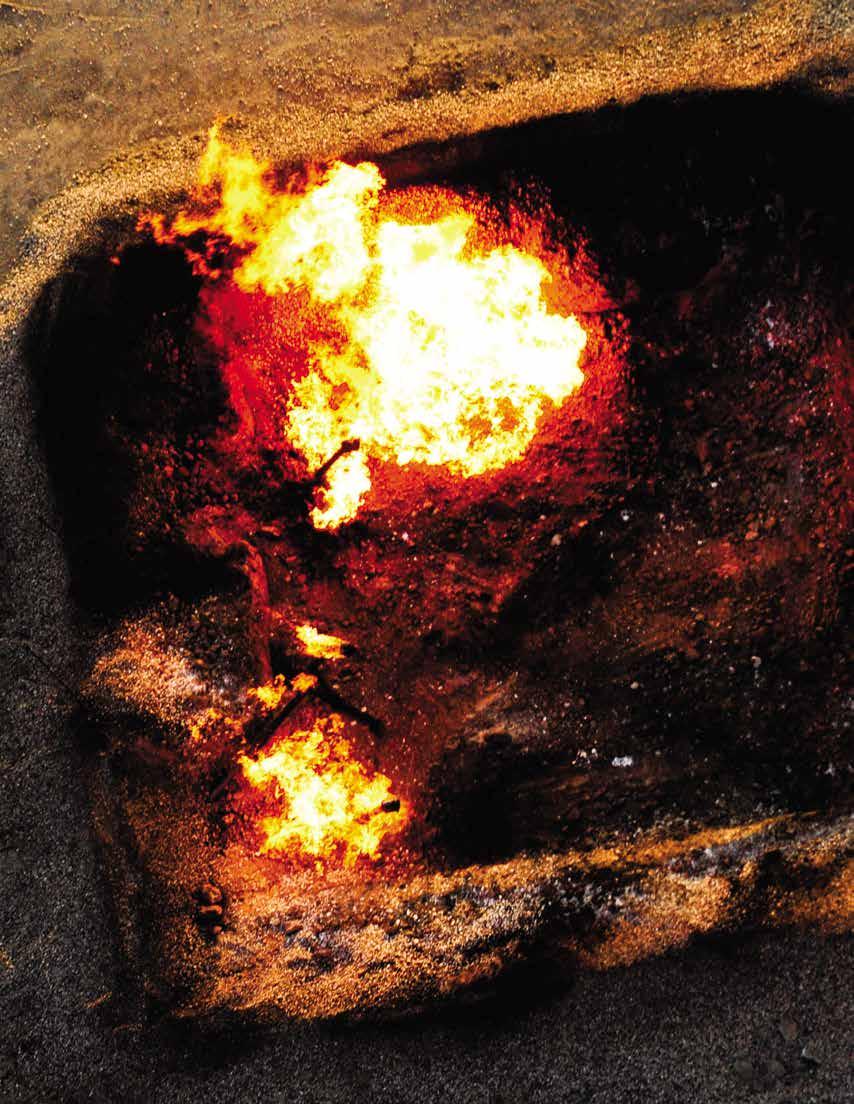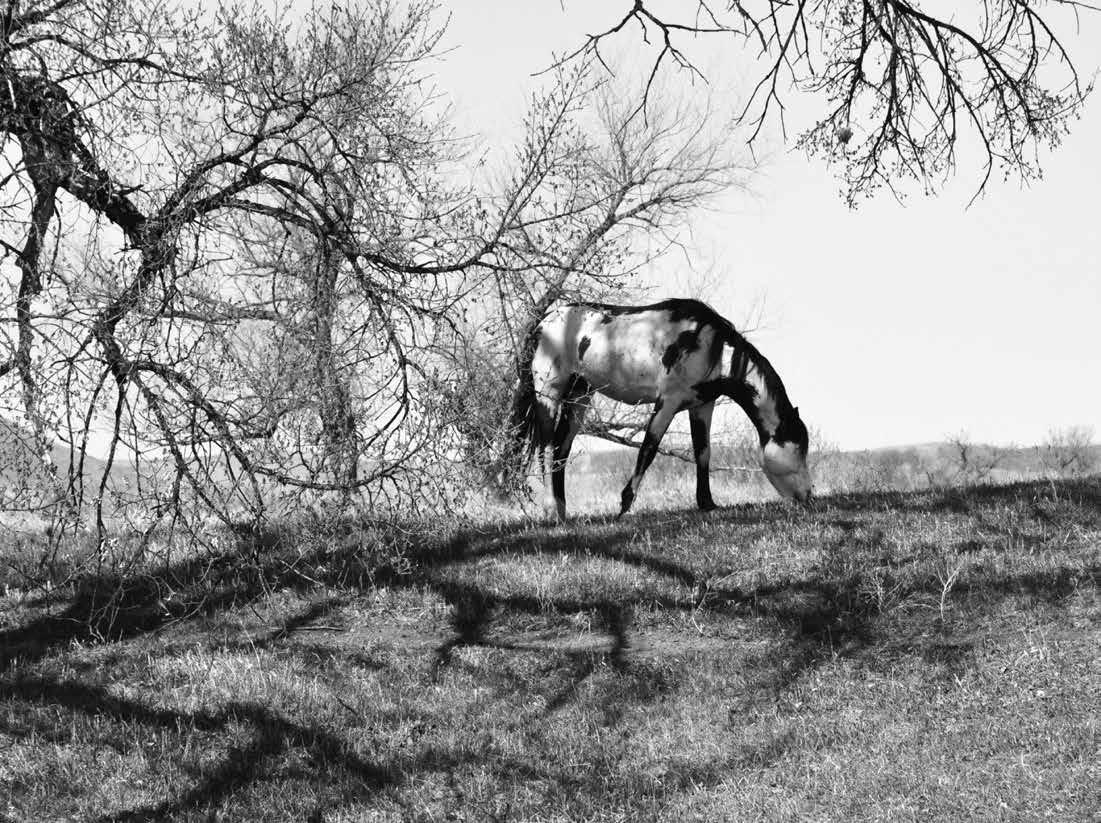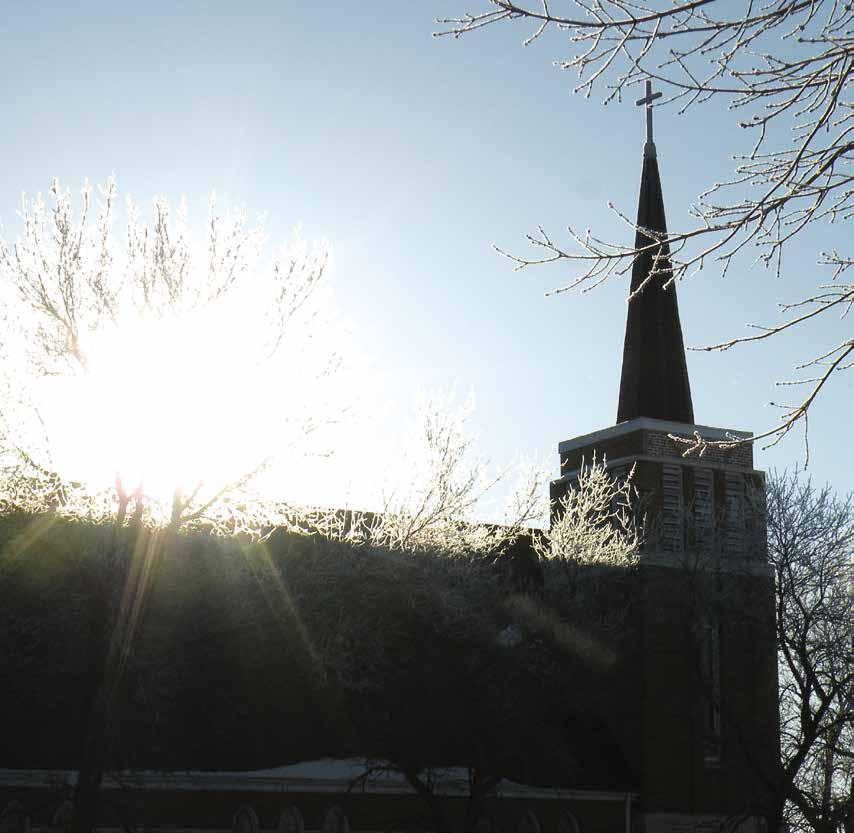
12 minute read
In the Eye of the Boom
Photo © Ben Garvin
By Todd Melby
Advertisement
When my wife called, I was at DK’s Lounge in Williston. The afternoon was on the cusp of evening. The beers were on the verge of becoming whiskeys. The men who’d claimed the corner were smoking cigarettes, telling jokes, and trying to forget about the patch. I wasn’t one of them, but I was with them. They humored me.
I pulled the silver rectangle from my pocket and said hello. Six hundred miles away, she was walking the dog. I escaped to a room next to a side entrance, a place crowded with mops, brooms, and empty Budweiser cases. She cooed birthday greetings in my ear. It was October 17, 2012. Fifty-two years earlier, I’d spent the evening being cooed at by another woman in Hettinger, one of the few western North Dakota towns with a hospital, located a few hours south of Williston.
Between those two nights, between those five decades, I’d spent most of my life outside North Dakota. As a child, I’d lived in the American West and in an Ohio suburb before my father returned home to Hettinger with us in tow. I was sixteen and the new kid in town. I played basketball and American Legion ball for the Hettinger nine, but not well. When I came to the plate, I shuffled behind the catcher with my head down, dreading his next words, “Number nine hitter. Easy out.”
So at eighteen, I headed east to start a new life. In Minneapolis, I eventually became a man. A husband, twice. A father, also twice. A radio disc jockey and years later, a radio reporter. And then my sister, a music teacher in Hettinger, told me about the boom, about guys sleeping on cots, about places called man camps. You gotta see this, she said.
So here I am, back in North Dakota. Drinking during the day at DK’s. Celebrating my birthday with guys I barely know, amid mops, brooms, and empty beer cases. In the eye of the boom.
I arrived in March. As I rolled into the oil patch for the first time, snow curled at the edges of the blacktop. I was a few miles north of Stanley on Highway 8. The four-lane comfort of Highway 2 had given way to a twisting two-laner. As I worked my way north to Bowbells, a place where I’d rented a room, the wind grew stronger and snow speckled my windshield. Every now and then, the white lines that usually mark a state highway disappeared. Heavy traffic or neglect had worn away the paint. It gave me pause.
And then I saw it. A hulking truck barreled towards me like a giant stegosaurus, wide and menacing. On its top: a flashing orange light, sending warning signals in every direction. For a moment, I didn’t know what to do; then I tugged the steering wheel to the right and hugged the shoulder. It roared past me, its wide load billowing over the faint dotted line in the middle of the road, a mere suggestion.
Soon, I arrived in Bowbells to find my new home: a two-room flat constructed of cinder block walls and a windowless bedroom. The owner showed me around the place, which he hoped to rent to oilfield workers and pipe-liners. For now, he was stuck with a reporter. The toilets were down the hall. A pod of showers, each with a private door, stood at attention next to washing machines and a place to sit and watch television. A kitchen was tucked in the back, its fridge stacked with frozen pizza and sandwiches available for purchase. But that wasn’t enough to placate hungry, weary men.
One night, a Halliburton crew wandered in. After inspecting their surroundings, one guy groused to his mates. “This place is worse than a man camp,” he said. “At least a man camp has food.”
Food was a problem. The town had no grocery stores.
The Farmer’s Union gas station sold coffee, junk food, pop, and, on some days, homemade goulash in a crockpot. No wonder I jumped at the chance a couple weeks later to move into the house of a retired social worker in Williston. Chris and her husband, John, a company hand on a drilling rig, rented me a two-bedroom basement apartment with shower, toilet, and a makeshift kitchen (coffee maker, microwave, toaster oven, fridge) for the same price. Done.
I wasn’t alone in struggling to find a decent place to sleep in oil country. In my first few months on the job, I met lots of men who told me about shacking up in cars, RVs, and trailers without running water. John, a military veteran, dozed in his car while looking for work in Williston. “Funny, waking up in parking lot,” he told me. “The first thing you see is exhaust from probably 25 other cars in the parking lot from other folks sleeping in their cars.” Shane, an oilfield worker I met in Watford City, had no running water in his RV. Neither did Terry, who was living in a makeshift mobile home park, wedged into a farm field near the ghost town of Wheelock. I’d just finished interviewing three young men who shared a nearby trailer when he pulled me aside. The stout, middle-aged man from New Jersey wanted me to know this: “Nobody wants to have three guys living in a 17foot trailer,” he said. “We’re doing what have to do to make money to support our families and pay our bills.” For Terry, that meant boiling hot water in pots to take “birdbaths” in his camper.
In interviews, people say things only once; once they’re recorded, if those words are poetic, funny, or insightful, I can play them over and over again on my computer’s sound editing program. And then again online. Terry’s quote was one of those memorable lines for me. It underscored a fact I was seeing on Williston’s streets every morning when I went for a walk: America’s economy was so bad for working people that thousands of them came to North Dakota to get a job that paid something more than minimum wage, which everyone knows isn’t nearly enough. This wasn’t a new Gold Rush. This was an updated version of The Grapes of Wrath. The Joads arrived here every day, praying for work.
A carload of Floridians in a shiny car and an underwater mortgage. A couple of women from Kalispell, Montana, trying to earn a few bucks cleaning man camps. A man who posted his phone number and a “Ready to Work” sign in his pickup window while parked near Williston’s Amtrak depot. Heck, even a dishwasher arrived here, humping a backpack, in hope of higher wages. “I call it my mountain backpack, like the mountain climbers wear,” the lanky 48-year-old told me. “I’ve got my sleeping bag in there. I find me a patch of woods or an abandoned building. I’ve just been winging it, you know.”
Lots of North Dakotans wish everyone would just stay home. At the Sportman’s Bar in McGregor, a place so small Census Bureau bureaucrats don’t even bother to tally up its inhabitants, the locals are pretty much done with the boom. They gather in a corner near the front door, shoo away feral dogs that wander in, and wish they could do the same to the oil companies and their hired hands.
“It’s destroying the way of life in this part of the state,” a man named Lynn told me. “And they don’t seem to care. It wrecks roads. They put roads where there weren’t roads before. It brings the dregs of society into this state.” He looked up at the deer and caribou heads mounted on the walls. Or maybe he was just staring off in the distance. Then he added, “The state of North Dakota is in bed with the oil companies.”
Other locals don’t see it that way. Lots of young guys from Minot, Williston, and Watford City are thriving in the oilfields and know how to enjoy the North Dakota outdoors when they’re not. While driving south on Highway 85 one morning, I saw someone in a ball cap, prowling the edges of the Missouri River with a bow and arrow. I gotta see this, I said to myself. After turning the vehicle around, I met Ben, a fresh-faced man who had been up working all night, but still had a smile on his face because he loved fishing for carp without a line. “I should be sleeping, but forget that idea,” he said.
As traffic roared by just yards away, the Minot native sloshed through mud at river’s edge and kept his eyes on the water. A carp might just ripple in the reeds. If so, Ben wanted to be ready with his bow and arrow. “I’ve been with Colter Energy for two years,” he said. “I’m twenty years old and I’m running my own crew right now. I’m probably making 120 grand a year. For being twenty years old, that’s pretty damn good.”
Ben, and everyone else in the oil patch, works mind-numbingly long hours. A forty-hour week does little to fill the wallet. Overtime, and lots of it, is where the big money lies. Geoff, twenty-eight, a graduate of Williston High School, labored at an oilfield service company, which gave him the opportunity to earn big money at a high cost. On one pipe recovery job, he worked eleven days straight, catching catnaps in his pickup at the work site. “Sleep. What’s sleep?” he told me. “I don’t get much of it at all. It’s pretty rare anymore. Days off, you sleep a lot. You don’t enjoy it. Even when you go to sleep, there’s a million things you should be doing.
Running errands. Cleaning your house. Not enough hours in the day to do the stuff you miss.”
Geoff often nods off during movies, requiring him to hit play again and again on the DVD and watch the same one multiple times. He has curled up on the carpet while folding clothes. And he’s grabbed catnaps at stores. “I’ve done it in Home Depot when my parents were looking at lawn furniture,” he said. “I probably looked like an eighty-year-old man just camping on the mall bench. All I needed was a woman’s purse to hold.”
Back at the Sportsman’s, Gayle was pouring drinks. This mother of teenage girls lives outside of McGregor on her family’s farm. Before the boom, she knew everyone’s name and what they drove. Nowadays, she worries about her daughters’ safety and her own. So she shoves a tiny gun into her bra. “Usually right now I just carry a little .380 … something that isn’t heavy or burdensome.”
She isn’t the only woman reaching for protection. My photographer, Ben, and I met Nathina, a young Floridian, at a Watford City coffee shop. She came to North Dakota for higher wages, but instead encountered a wall of sexual harassment. When she jogs, men hoot and holler. They hit on her at grocery stores and bars. “They’re like packs of wolves,” she said. “They come and they circle around you and they try and buy you drinks and follow you out of the grocery store. It’s ridiculous.” So Nathina packs pepper spray, an eight-inch blade or a .22 pistol wherever she goes. “I don’t leave home without one of the few, if not all of them. Ever.”
After living in the land of Continental, Kodiak, and Nabors for nearly a year, people sometimes ask me for an opinion on the boom. I often stumble, not knowing where to begin. It’s such a big story, touching the lives of westerners in unpredictable ways. I don’t know whether to talk about the trucks that hog the roads or the lines that snake around fast food joints, day after day. Or the flares that light up the night sky, giving the oil patch an orange glow. Or the desperation that hangs off some people who arrive with hopes of starting a new life. Or just the grind of it all. Night, day, Christmas, Easter. The boom just goes on and on. Roughnecks on drilling rigs often brag about how fast their crew can trip pipe, which is the act of twisting giant pipes together to shove underground. The faster pipes are connected and wells get fracked, the faster the oil flows. And oil companies don’t make a dime until they can sell that oil at market. That frenzy takes place on rigs, far from the eyes of most people, but an outsider can sense it at truck stops and food shacks. Men in fire-retardant jumpsuits gather in small groups, hands shoved in pockets, eyes straight ahead. They talk about the job, the roads, the number of days until they can go home. They are a haggard, tired-looking bunch.
Which is why on some weekends, I escape. Leaving Williston on a Friday afternoon, I jog through the always-under-construction town of Alexander, surge past the Petro Fuels stop near Arnegard, slow down for the inevitable, L.A. rush hour-like traffic jam at Watford City’s sole stoplight, then zip past Teddy Roosevelt National Park and on to Killdeer where I stop to buy a six-pack at Lariat Liquors. And there’s the temptation to pause for an on-the-spot cold one at the 2 7/8 Bar outside of town, named not for its distance from town, but for the diameter of a drill bit. An hour later, I’m south of Dickinson and the oil traffic gives way to the occasional flatbed hauling hay bales. As the road empties, I begin enjoying the drive, the crops fluttering in the inevitable wind, the solitude.
In Hettinger and other towns south of I-94, people want to know when the boom is headed their way. Geological maps show oil buried in rocks deep under the earth here too. People want to know when the big payday might arrive. Or, if they don’t own oil rights, when the rush of giant trucks and bedraggled men might invade their towns like a swarm of mechanical locusts. At first, I was one of these people. I wondered, not just out of curiosity, but because I might personally benefit. Along with many aunts, uncles, cousins and siblings, I own oil rights west and south of Hettinger. Which means I might be rich someday or at least have a few extra bucks in my pocket. From my home in Minneapolis more than a year ago, that seemed desirable.
Now, I’m not so sure. I’ve seen how the boom grinds through everything in its path: roads, land, workers, even entire towns.
Todd Melby is lead producer of Black Gold Boom, a public media project exploring North Dakota’s oil boom. As part of the series, he directed and wrote Rough Ride: The Oil Patch Tour, an interactive documentary on the boom. He’s won multiple journalism awards and is a 2013 McKnight Media Artist fellow.










